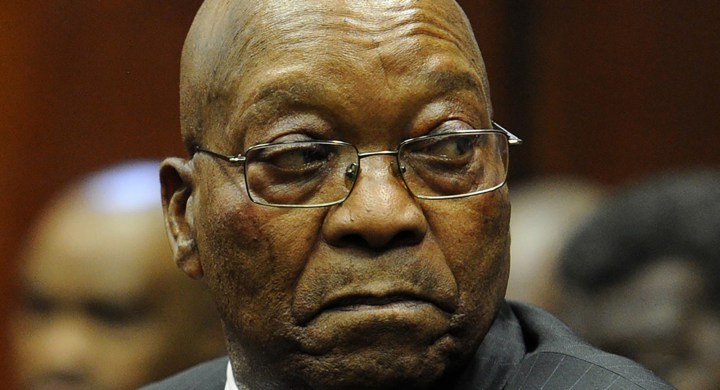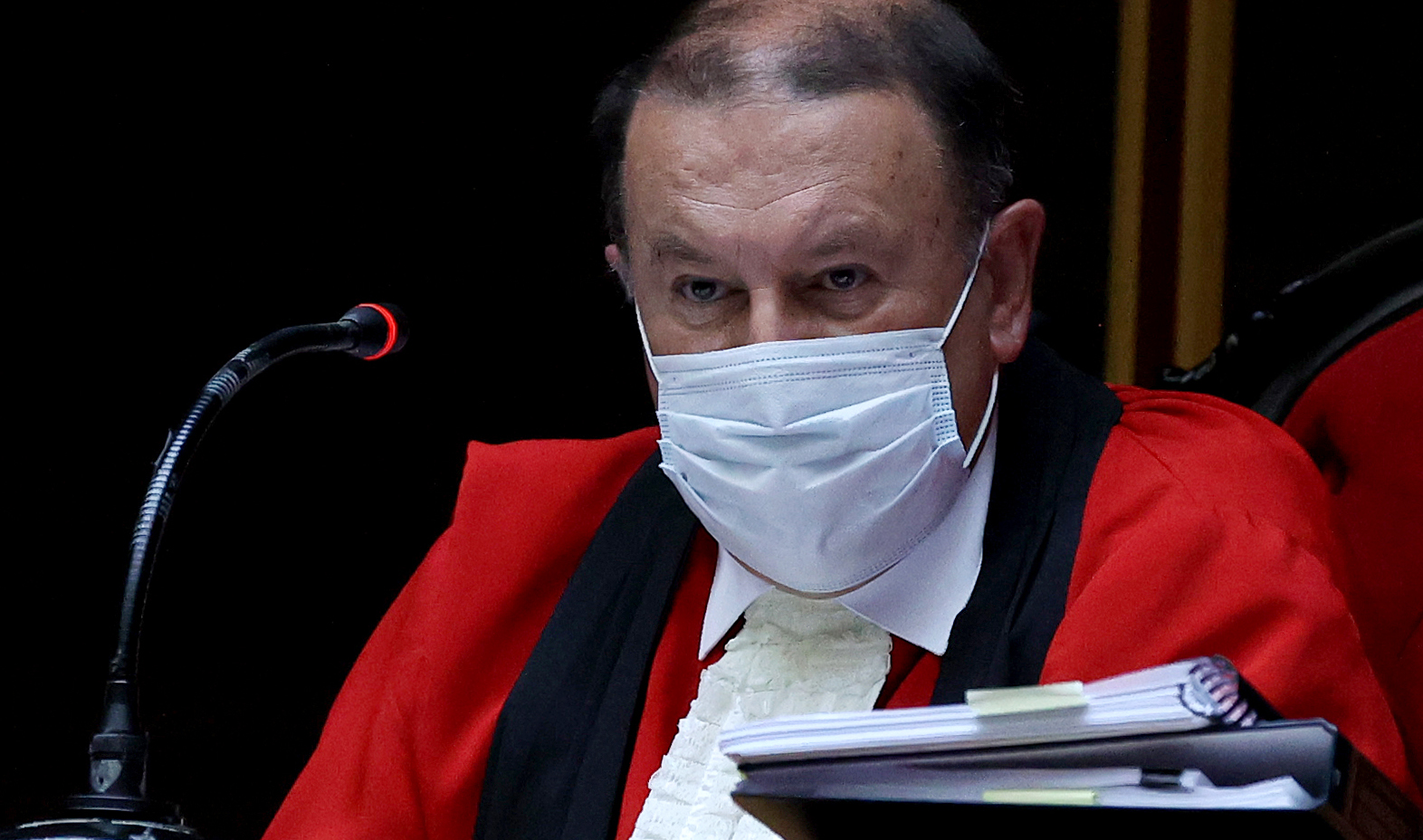STALINGRAD DEFENCE OP-ED
Zuma’s strategy designed to grind down the prosecution — but SA’s robust legal system will prevail

On any reasonable reading of Jacob Zuma’s appeal papers, the chances of him succeeding are barely anything above zero. But that is not the point of the Stalingrad strategy. Its purpose is to wear down the prosecution and delay the consequences of criminal liability.
When Pietermaritzburg High Court Judge Piet Koen granted the postponement of former president Jacob Zuma’s corruption trial, it marked the latest episode in a legal saga that started in the early 2000s. Zuma has used the law to effectively evade prosecution, never having to account for the crimes he is accused of.
Zuma’s defence strategy with its postponements, appeals and other legal stratagems bears all the hallmarks of the Stalingrad strategy. It has given Zuma some success, but it cannot be sustained for much longer. He will inevitably have to face trial.
The Stalingrad strategy aims not to assert constitutional rights in good faith but to employ a series of legal tactics to frustrate and wear down the prosecution. The strategy often sits between two extremes. The one is a legitimate “first line” of defence where the accused person raises legal challenges in an attempt to protect their constitutional right to a fair trial as per section 35(3) of the Constitution.
The other extreme, a “second line” of defence, is when the accused exploits the legal system to cause a significant delay in proceedings, thereby causing a violation of another constitutional right — the right to have a trial begin and conclude without an unreasonable delay (in terms of sec 35(3)(d) of the Constitution). In the event of the second line of defence succeeding, the accused may apply for a “permanent stay” of their trial, meaning that the case is no more and the accused no longer runs the risk of prosecution for these charges.
However, the prospects of success of either of these defences (mainly the second) depend on the perception of success. I propose two possible conceptions of success. The first and perhaps obvious success is simply avoiding the consequences that flow from criminal liability for as long as possible. In this regard, Zuma has been largely successful. Save for his brief stint in Estcourt Prison for contempt of court — which is unrelated to his corruption case — and which he has now also evaded through dubiously granted medical parole, he has been a free man.
His second defence — the permanent stay of prosecution — has not been so successful. For a defence of a permanent stay to be successful and a criminal trial done away with, it would need to be shown that, on balance, the pre-trial prejudices (such as negative press coverage) suffered by Zuma outweigh the “interests of society in bringing suspected criminals to book”.
The Constitutional Court in Sanderson v Attorney-General, Eastern Cape, held that the ultimate question is whether the burdens borne by the accused, because of the delay, are unreasonable. In answering this question, the inquiry is to focus on the prejudices which are a result of the delay. This shifts the basis of the reasonableness inquiry from a specific period of time to the weight of the burden.
Unfortunately for Zuma, much of the delay and, thus, potential burden has been self-inflicted and is still immeasurably less than the interests of society to bring him to book. This was confirmed by a full bench of the KwaZulu-Natal High Court in November 2019 when it denied his bid to have his prosecution permanently stayed, and later by the Supreme Court of Appeal when it denied his appeal application based only on the papers filed (without an oral hearing).
This has forced Zuma to change track and pursue a completely different tactic – that of ousting lead prosecutor advocate Billy Downer SC, accusing him of bias and misconduct. This led to Zuma’s application, in terms of section 106 of the Criminal Procedure Act, that Downer has “no title to prosecute” and should therefore be removed from the case.

Pietermaritzburg High Court Judge Piet Koen. (Photo: Sandile Ndlovu)
But this tactic was predictably unsuccessful, and Judge Koen dismissed it as lacking merit. The Supreme Court of Appeal agreed and denied him leave to appeal, saying any appeal on this ground has “no prospects of success”.
Zuma now seeks to evoke the exceptional procedure of a reconsideration of his appeal by the president of the Supreme Court of Appeal. This was the grounds on which he sought a postponement of his criminal trial on Monday, 11 April 2022 and which Judge Koen was hard-pressed to grant until 11 May 2022.
On any reasonable reading of Zuma’s appeal papers, the chances of him succeeding are barely anything above zero. But that is not the point of the Stalingrad strategy. The very reason for pursuing such a strategy is to wear down the prosecution and delay the consequences of criminal liability.
While Zuma’s defence has successfully delayed his corruption trial for the past 20 years, he is fast running out of options. The pressure is mounting, and the cracks in the Zuma defence are beginning to show. His legal team stood up on 11 April and resorted to making underhanded threats by suggestively reminding the court that the July 2021 insurrection was “partly motivated or sparked, to whatever extent, by a sense of public outrage at perceived injustice and special treatment of Mr Zuma”.
If anything is to be taken from the legal debacle that has played out over the past 20 years, it is that the South African legal system is robust and will not cave in the face of pressure, irrespective of its source. The Zuma camp, in various capacities, with its relentless reliance on the law as sword and shield, has forced our courts to take heed of the Stalingrad strategy and develop robust mechanisms to put a stop to it.
And it is for this reason the Stalingrad strategy will not continue to find success in Zuma’s corruption case. The road may be long and winding, but it will inevitably lead back to Zuma standing before the Pietermaritzburg High Court for trial. DM
Tayla Pinto holds an LLB from the University of Cape Town and is pursuing an LLM in constitutional and administrative law. She is a senior research assistant at the Democratic Governance and Rights Unit and is also a project manager at the iNtaka Centre for Law and Technology.



















 Become an Insider
Become an Insider
All well and good, but one factor is missing. Once all options have been exhausted, out comes the trump card. The false and one-sided medical narrative. Like Shaik, he is terminally ill and on his death bed. Yeah sure! His band of wayward and moronic followers, not to mention the highly deceitful and disgraceful legal team, will shrill to the maximum demanding compassion for an old sick man. The only sick in Zuma is his mind. Independent medical assessment of Zuma will never happen as there is no political will and I honestly cannot see Zuma being held accountable, which will be a gross travesty of justice considering how he has brought this country to its knees. The state doesn’t even charge those responsible for the July riots even though it is abundantly clear who was behind it.
There is a significant difference between knowing and proving, beyond reasonable doubt.
This fact is the corner stone on which Zuma relies. Considering the current state of our forces of law and order, the problem become much bigger, unfortunately!
We must wait, and hope, for justice however long it takes
Step 1 – get rid of the ANC government. Then, hopefully, an end will be put on the Stalingrad tactic which currently is being copied by the disastrous Public Protector. Also, the legal profession should take a good look at itself and introduce a code of ethics for legal practitioners.
Justice deferred is justice denied. Zuma has been spectacularly successful in his Stalingrad defence and has made a laughing stock of our judicial system, top to bottom. He is an old man by the time the system catches up to him and his family and gang of cronies are already fabulously wealthy. I’d say he has played his despicable game and won. Resoundingly. It doesn’t matter if he is running out of options because he has already succeeded. I’ll bet his cronies will do exactly the same if the law comes after them too.
Who or what organisation is footing the bill for the Zuma’s legal expenses?
And why is the prosecution
/court not simply asking the question of Zuma and his acolytes HOW, in what way, has Zuma been victimised and not been given the opportunity to state his case as he claims?!
We’ve all witnessed his appalling contempt of court, the constitution and the legal system, and it beggars belief that our judiciary are pandering to his whims.
He’ll use health as a last defence, and judging by the shocking decisions handed down on Shaik and Selebi amongst others, there is no shortage of dishonest “doctors” and other nefarious characters such as Arthur Fraser to assist in ensuring he remains a free man until after all is said and done, he dies peacefully in his sleep.
Please God, you know what to do.
I’ve been reading this rhetoric for what feels like a good few years. Commentators keep saying he is running out of options and his day in court is looming, but they have all been wrong. This is just another one of those articles.
The law is not the same for everybody. Those with the means just hire dishonest and unscrupulous lawyers to delay, deny, lie and obfuscate. Zuma and his gang of wicked cronies are prime examples. Somehow “innocent until proven guilty” should not be allowed to stand when there is such overwhelming evidence against an individual. It is abused ad infinitum and justice is denied. Wouldn’t it be great if these rapacious thieves and heartless crooks were put in jail and let them prove they are innocent! Shift the onus on to them. That would truly be something to behold and also test how good their obnoxious legal teams are.
Given the twenty year delay in prosecution, I would question the robustness of the South African legal system. What is urgently required is a specialist court that deals with corruption matters expeditiously.
The South African legal system can be summed up as prevarication, delay, and avoidance. Too many trials drag on with little or no consequence for those who cause the delay.
I would go with that Mark. Besides, if Zuma IS convicted we will simply have a repeat of last July’s looting.